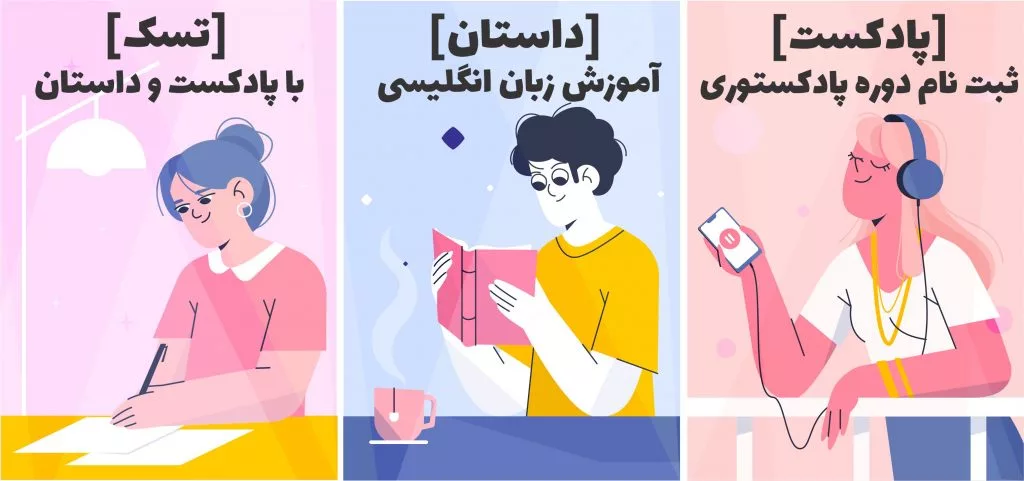پادکست انگلیسی BBC – تب مد روز
بعضی افراد ترجیح میدن به جای خرید لباس جدید برای سال نو از همون لباس های قدیمی شون استفاده کنن. با این حال، سایت هایی که لباس های مد روز می فروشن فروش خیلی خوبی دارن. آیا می تونی امسال از خرید لباس جدید صرف نظر کنی و همون لباس های قدیمیت رو بپوشی؟ آیا این کار رو به خاطر دغدغه های محیط زیستی انجام می دی؟ (یا دغدغه های مالی؟) (نظر خودتون رو به انگلیسی در بخش دیدگاه با ما در میون بذارید!) در پادکست انگلیسی BBC – تب مد روز میشنویم که جورجینا و نیل درمورد مد روز و محیط زیست صحبت می کنن و در طول مسیر کلمات مرتبط آموزش میدن.
سوال پادکست انگلیسی BBC – تب مد روز:
Do you know how many items of clothing were sent to landfill in the UK in 2017? Was it…
a) 23 million items
b) 234 million items
c) 2.3 billion items
به پادکست خوب گوش کن تا جواب رو پیدا کنی.
اگر می خوای گوش دادن به پادکست تا حد امکان برات ساده و کارآمد باشه مراحل زیر را دنبال کن:
هر روز به پادکست گوش کن. وقتی براش یه وقت ثابت در روز در نظر بگیری برات تبدیل به عادت میشه و این عادت هرروز پیشرفت میکنه.
پادکستی رو پیدا کن که موضوعش برات جالب باشه. وقتی از خود موضوع لذت ببری یادگیری هم برات لذتبخش میشه.
به پادکستی گوش کن که transcript یا متن داره. این بهت کمک می کنه تا کلمات و عبارات جدید رو به سرعت در متن پیدا کنی و ساختار انواع مختلف جمله رو خوب یاد بگیری.
پس از گوش دادن به پادکست با متن، در مرحله بعدی سعی کن بدون نگاه کردن به متن این کار رو انجام بدی. این کار مهارت شنیداری رو تقویت می کنه و کمک می کنه تا انگلیسی زبانان بومی را راحت تر درک کنی، حتی اگر خیلی سریع صحبت کنن.
اگه به پادکست انگلیسی گوش کردی و نتونستی کامل متوجه اش بشی، ناامید نشو. پادکست هایESL -English as Second Language بیشماری وجود دارن که برای سطوح مختلف، از ابتدایی تا پیشرفته طراحی شدن. مطمئنا هر روز می تونین یه پادکست مناسب با سطح خودت پیدا کنی.
فراموش نکن که هرچی بیشتر تمرین کنی در اون مهارت رشد میکنی! به قول انگلیسی ها: Practice makes perfect
واژگان کلیدی پادکست انگلیسی BBC - تب مد روز
| معنی به فارسی | معنی به انگلیسی | واژه |
| تعهد | publicly promising to do something (you can make a pledge to do something) | pledging |
| برون سپاری | given to another company to do, often because that company has the skills to do it or it can be done cheaper | outsourced |
| به بهای کمتری انجام دادن کاری نسبت به رقیب | if a company undercuts another, it charges less to do a job than its competitor | undercuts |
| ناشی از ( چیزی) | caused by or a result of something | stems from (something) |
| غیر منطقی | unreasonable – not sensible, more driven by emotions than practical reason | illogical |
| واکنش منفی شدید | strong negative reaction to what is happening | backlash |
BBC 6 minute English - Could you give up fast fashion

متن پادکست انگلیسی BBC - تب مد روز
Note: This is not a word-for-word transcript
Georgina
Hello. This is 6 Minute English from BBC Learning English. I’m Georgina…
Neil
And I’m Neil.
Georgina
In this programme, we’re talking about buying clothes and only wearing them a few times before buying more clothes!
Neil
This is something known as fast fashion – it’s popular, it might make us feel good, but it’s not great for the environment.
Georgina
Which is why lots of people this year are pledging – or promising publicly – to buy no new clothes.
Neil
I for one am wearing the same shirt I bought seven years ago.
Georgina
You’re certainly not a fashion victim, Neil! But first, let’s test your knowledge of fast fashion with a question. Do you know how many items of clothing were sent to landfill in the UK in 2017? Was it…
a) 23 million items,
b) 234 million items or
c) 2.3 billion items
What do you think, Neil?
Neil
I’m sure it’s lots, but not billions, so I’m going to say 23 million items.
Georgina
I shall tell you if you’re right at the end of the programme. Let’s talk more about fast fashion, which is being blamed for contributing to global warming.
Neil
And discarded clothes – that means ones that are thrown away – are also piling up in landfill sites, and fibre fragments are flowing into the sea when clothes are washed.
Georgina
It’s not great – and I’ve heard the average time someone wears something is just seven! So why is this, and what is driving our desire to keep buying more clothes?
Neil
I think we should hear from fashion journalist Lauren Bravo, who’s been speaking on the BBC Radio 4 programme, You and Yours. She explained that clothes today are relatively cheaper than those from her parents’ days…
Lauren Bravo, fashion journalist
A lot of clothing production got outsourced – offshored over to the developing world, so countries like Indonesia, India, Bangladesh and China
are now responsible for making the vast bulk of all the clothes that are sold in the UK. And with that, we’ve seen what we call ‘chasing the cheapest needle’ around the world, so the fashion industry constantly looking to undercut competitors, and with that clothes getting cheaper and cheaper and cheaper.
Georgina
Right, so clothes – in the developed world at least – have become cheaper because they are produced in developing countries. These are countries which are trying to become more advanced economically and socially.
Neil
So production is outsourced – that means work usually done in one company is given to another company to do, often because that company has the skills to do it. And in the case of fashion production, it can be done cheaper by another company based in a developing country.
Georgina
Lauren used an interesting expression ‘chasing the cheapest needle’ – so the fashion industry is always looking to find the company which can make clothes cheaper – a company that can undercut another one means they can do the same job cheaper.
Neil
Therefore the price of clothes gets cheaper for us.
Georgina
OK, so it might be good to be able to buy cheaper clothes. But why do we have to buy more – and only wear items a few times?
Neil
It’s all about our obsession with shopping and fashion. It’s something Lauren Bravo goes on to explain on the You and Yours radio programme. See if you can hear what she blames for this obsession…
Lauren Bravo, fashion journalist
Buying new things has almost become a trend in itself for certain generations. I think that feeling that you can’t be seen in the same thing twice, it really stems from social media, particularly. And quite often people are buying those outfits to take a photo to put on Instagram. It sounds illogical, but I think when all of your friends are doing it there is this invisible pressure there.
Georgina
Lauren makes some interesting points. Firstly, for some generations, there is just a trend for buying things.
Neil
It does seem very wasteful, but, as Lauren says, some people don’t like to be seen wearing the same thing twice. And this idea is caused by social media – she uses the expression ‘stems from’.
Georgina
She describes the social pressure of needing to be seen wearing new clothes on Instagram. And the availability of cheap clothes means it’s possible to post new images of yourself wearing new clothes very regularly.
Neil
Hmm, it sounds very wasteful and to me, illogical – not reasonable or sensible and more driven by emotions rather than any practical reason.
Georgina
But, there is a bit of a backlash now – that’s a strong negative reaction to what is happening. Some people are now promising to buy second-hand clothes, or ‘vintage clothes’, or make do with the clothes they have and mend the ones they need. It could be the start of a new fashion trend.
Neil
Yes, and for once, I will be on trend! And it could reduce the amount of clothes sent to landfill that you mentioned earlier.
Georgina
Yes, I asked if you knew how many items of clothing were sent to landfill in the UK in 2017? Was it…
a) 23 million items,
b) 234 million items or
c) 2.3 billion items
What did you say, Neil?
Neil
I said a) 23 million items.
Georgina
And you were wrong. It’s actually 234 million items – that’s according to the Enviro Audit Committee. It also found that 1.2 billion tonnes of carbon emissions is released by the global fashion industry.
Neil
Well, we’re clearly throwing away too many clothes but perhaps we can recycle some of the vocabulary we’ve mentioned today?
Georgina
I think we can, starting with pledging – that means publicly promising to do something. You can make a pledge to do something.
Neil
When something is outsourced,it is given to another company to do, often because that company has the skills to do it or it can be done cheaper.
Georgina
And if one company undercuts another, it charges less to do a job than its competitor.
Neil
The expression stems from means ‘is caused by’ or ‘a result of’. We mentioned that rise in fast fashion stems from sharing images on Instagram.
Georgina
And we mentioned this being illogical. So it seems unreasonable – not sensible, and more driven by emotions rather than any practical reason.
Neil
And a backlash is a strong negative reaction to what is happening.
Georgina
And that brings us to the end of our discussion about fast fashion! Please join us again next time. Bye.
Neil
Bye.
امیدوارم از پادکست انگلیسی BBC - تب مد روز لذت برده باشید.
گوش دادن به پادکست روش خوبی برای تقویت مهارت شنیداری و هم چنین یادگرفتن کلمات در بستر یک موضوع خاصه که این به تقویت مهارت مکالمه انگلیسی نیز کمک زیادی می کنه.
اگه تو هم از اون آدمهایی هستی که از گوش دادن به پادکست لذت می بره برات یه خبر خوب دارم! آموزشگاه زبان انگلیسی 24talk یه دوره طراحی کرده مبتنی بر پادکست و داستان کوتاه به اسم "پادکستوری - Podcastory". این دوره سعی کرده یادگیری زبان انگلیسی رو مناسب با نیاز و سطح زبان آموز به یه فرایند بسیار مفرح، موثر، سریع و کم هزینه تبدیل کنه.
همین الان می تونی با کلیک روی عکس زیر و ثبت نام در دوره ی آموزش زبان انگلیسی با پادکست و داستان ۲۴talk اولین و مهم ترین قدم رو برای یادگیری زبان انگلیسی برداری. وقت رو از دست نده!








